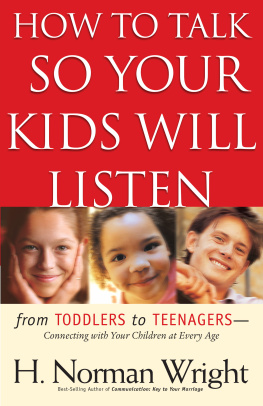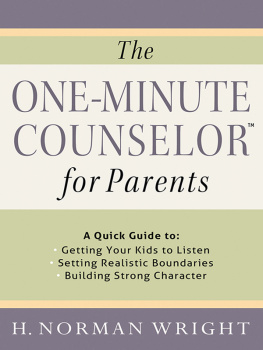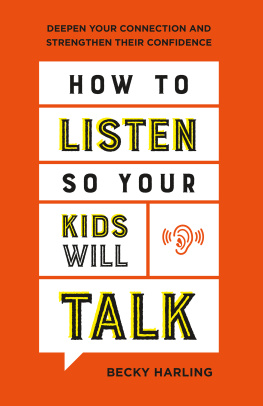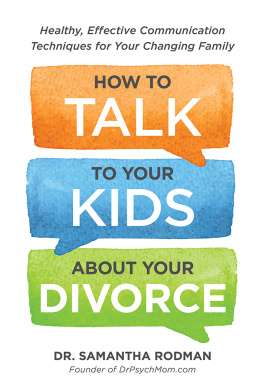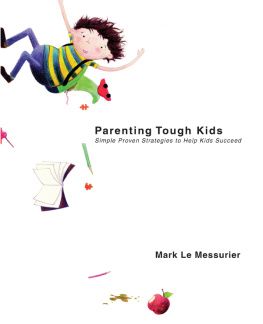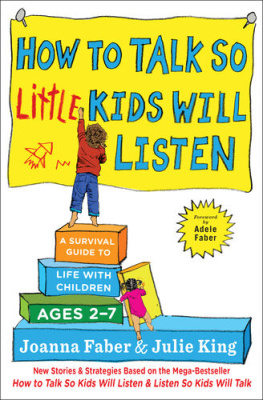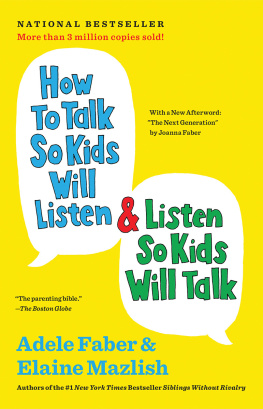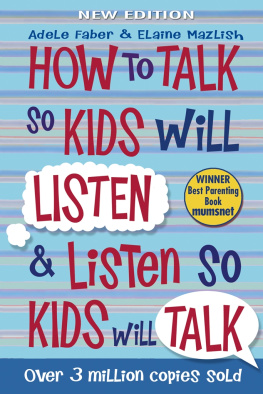H. Norman DMin Wright - How to Talk So Your Kids Will Listen
Here you can read online H. Norman DMin Wright - How to Talk So Your Kids Will Listen full text of the book (entire story) in english for free. Download pdf and epub, get meaning, cover and reviews about this ebook. year: 2010, publisher: Baker Publishing Group, genre: Children. Description of the work, (preface) as well as reviews are available. Best literature library LitArk.com created for fans of good reading and offers a wide selection of genres:
Romance novel
Science fiction
Adventure
Detective
Science
History
Home and family
Prose
Art
Politics
Computer
Non-fiction
Religion
Business
Children
Humor
Choose a favorite category and find really read worthwhile books. Enjoy immersion in the world of imagination, feel the emotions of the characters or learn something new for yourself, make an fascinating discovery.
- Book:How to Talk So Your Kids Will Listen
- Author:
- Publisher:Baker Publishing Group
- Genre:
- Year:2010
- Rating:3 / 5
- Favourites:Add to favourites
- Your mark:
- 60
- 1
- 2
- 3
- 4
- 5
How to Talk So Your Kids Will Listen: summary, description and annotation
We offer to read an annotation, description, summary or preface (depends on what the author of the book "How to Talk So Your Kids Will Listen" wrote himself). If you haven't found the necessary information about the book — write in the comments, we will try to find it.
How to Talk So Your Kids Will Listen — read online for free the complete book (whole text) full work
Below is the text of the book, divided by pages. System saving the place of the last page read, allows you to conveniently read the book "How to Talk So Your Kids Will Listen" online for free, without having to search again every time where you left off. Put a bookmark, and you can go to the page where you finished reading at any time.
Font size:
Interval:
Bookmark:
Praise for
HOW TO TALK
SO YOUR KIDS
WILL LISTEN
I have learned more basic communication skills with my children from this one book than any book I have ever read on the subject. Norm Wright knows how to deliver practicality and commonsense parenting at its best.
JIM BURNS, PH.D.
AUTHOR, THE TEN BUILDING BLOCKS FOR A HAPPY FAMILY
PRESIDENT, YOUTHBUILDERS
Now is the time to turn up the frequency and get in tune with our children and teens. How to Talk So Your Kids Will Listen offers biblically sound, practical techniques on how to overcome parent-child communication differences. Norm Wrights real-life examples and hands-on approach encourage parents to step out in confidence and exert positive control over those differences.
JOSH D. MCDOWELL
AUTHOR, CHILDREN DEMAND A VERDICT AND HOW TO BE
A HERO TO YOUR KIDS
SPEAKER

2004 H. Norman Wright
Published by Bethany House Publishers
11400 Hampshire Avenue South
Bloomington, Minnesota 55438
www.bethanyhouse.com
Bethany House Publishers is a division of
Baker Publishing Group, Grand Rapids, Michigan.
www.bakerpublishinggroup.com
Bethany House Publishers edition published 2014
ISBN 978-1-4412-6772-6
Previously published by Regal Books
Ebook edition originally created 2013
All rights reserved. No part of this publication may be reproduced, stored in a retrieval system, or transmitted in any form or by any meansfor example, electronic, photocopy, recordingwithout the prior written permission of the publisher. The only exception is brief quotations in printed reviews.
Library of Congress Cataloging-in-Publication Data is on file at the Library of Congress, Washington, DC.
All Scripture quotations, unless otherwise indicated, are taken from the NEW AMERICAN STANDARD BIBLE, Copyright 1960, 1962, 1963, 1968, 1971, 1972, 1973, 1975, 1977, 1995 by The Lockman Foundation. Used by permission.
Other versions used are:
AMPScripture taken from THE AMPLIFIED BIBLE, Old Testament copyright 1965, 1987 by the Zondervan Corporation. The Amplified New Testament copyright 1958, 1987 by The Lockman Foundation. Used by permission.
NCVScriptures quoted from The Holy Bible, New Century Version, copyright 1987, 1988, 1991 by Word Publishing, a division of Thomas Nelson, Inc. All rights reserved. Used by permission.
NIVScripture taken from the Holy Bible, New International Version. Copyright 1973, 1978, 1984 by International Bible Society. Used by permission of Zondervan Publishing House. All rights reserved.
TLBScripture quotations marked (TLB) are taken from The Living Bible, copyright 1971. Used by permission of Tyndale House Publishers, Inc., Wheaton, IL 60189. All rights reserved.
Cover design by Robert Williams
Interior design by Stephen Hahn
Edited by Amy Spence

Uniqueness
Its too bad there isnt a beatitude for parents that says, Blessed is the flexible parent, for he or she will have the greatest opportunity to communicate with his or her child. Every child is unique. Each one is different. This is the way it should be. It is the way God created us.
When children are born, they come with an inheritance. It comes from the gene pool of each parent. It might not be seen at first, but it gradually unfolds. If you have three children, its as though you picked up one from Target, one from Nordstrom and one from JCPenney. Theyre all different, arent they? Each child thinks differently, acts differently and communicates differently. Read how some parents describe their children:
My daughter is a real space cadet. Sometimes I wonder what she uses for a brain.
My son has a big mouth. Hes loud and goes on and on.
I think my daughter is a hermit. I just cant understand why shes so quiet.
My son can get lost between his bedroom and the kitchen, especially when I ask him to do something.
My daughter talks first and thinks later.
My kid is so picky. Hell ask me the time, and Ill say, Oh, around four oclock. Then hell say, No, I want the exact time. What a pain.
My daughter is so absentminded. She seems to be thinking about too many things at the same time.
My daughter is way too sensitive. She always gets her feelings hurt.
I wonder if my son has any feelings. He always has to be right, even when it makes his friends dislike him. But he doesnt seem to care.
My son is only seven. But even now he has a place for everything, and he isnt satisfied unless everything is in its place before he goes to bed at night. Me? I let everything lie where it falls. But does he ever get after me about that!
My teenage daughter is a procrastinator. She gets her work done eventually, but her last minute antics disrupt the whole family.
I try to talk to my son, but he always changes the subject in the middle of the conversation. I sometimes wonder if his brain is stuck in neutral.
Did you notice some of the words used to describe the childrenspace cadet, big mouth, loud, hermit, lost, talks first and thinks later, picky, too sensitive, procrastinator, changes the subject? Do these words sound negative or positive? Are these traits you would want to change in your child, or could you accept them? What if each trait or characteristic is the way God uniquely created your child, and its your task to understand your child?
Children have quirks of behavior and personality that at times irritate their parents. Yet in most cases the problem isnt that children are bad; its simply that their responses and thought patterns are different from their parents.
You get frustrated because you cant understand why your child isnt more like you. Trying to change your childs personality to match yours is as pointless and futile as trying to change your childs physical features to make him or her look like you. The key to reducing your frustration over your childs quirks of behavior, and to communicate with him or her, is to understand and accommodate your childs unique personality style.
Every child is predisposed toward certain personality characteristics. These leanings reflect his or her genetic inheritance, birth order and early environment. A childs personality traits direct his or her preferences for responding to life and his or her communication stylemuch like a childs handedness directs his or her preference for completing manual tasks. For instance, just because a child is right-handed, doesnt mean the child never uses his or her left hand. The child may prefer his or her right hand strongly, rarely using his or her left hand. Or the child may be more ambidextrous and use his or her left hand for several tasks. The more the child practices his or her handedness preference, the more the child relies on it with confidence. Similarly, the more a child responds in line with his or her personality predisposition, the stronger that style becomes in the child.
In Psalm 139:14 (NIV), read King Davids words: I praise you because I am fearfully and wonderfully made; your works are wonderful. Christians believe that every person is made in the image of God and is of infinite worth and value. Every person is unique. Yet most parents find it much easier to value the aspects of their children that are similar to their own. Ive heard parents remark, Tommy is just like me, but Im not sure where Jill came from. She is so different from the rest of us.
Next pageFont size:
Interval:
Bookmark:
Similar books «How to Talk So Your Kids Will Listen»
Look at similar books to How to Talk So Your Kids Will Listen. We have selected literature similar in name and meaning in the hope of providing readers with more options to find new, interesting, not yet read works.
Discussion, reviews of the book How to Talk So Your Kids Will Listen and just readers' own opinions. Leave your comments, write what you think about the work, its meaning or the main characters. Specify what exactly you liked and what you didn't like, and why you think so.

